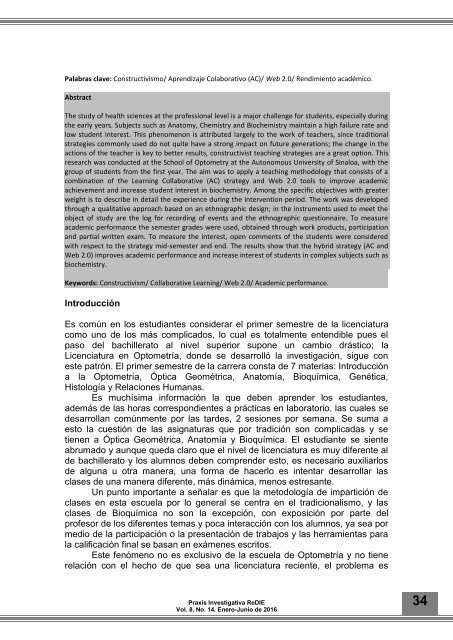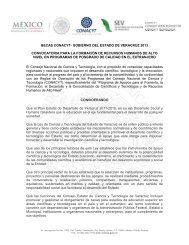PRAXIS INVESTIGATIVA ReDIE
praxisinv14
praxisinv14
You also want an ePaper? Increase the reach of your titles
YUMPU automatically turns print PDFs into web optimized ePapers that Google loves.
Palabras clave: Constructivismo/ Aprendizaje Colaborativo (AC)/ Web 2.0/ Rendimiento académico.<br />
Abstract<br />
The study of health sciences at the professional level is a major challenge for students, especially during<br />
the early years. Subjects such as Anatomy, Chemistry and Biochemistry maintain a high failure rate and<br />
low student interest. This phenomenon is attributed largely to the work of teachers, since traditional<br />
strategies commonly used do not quite have a strong impact on future generations; the change in the<br />
actions of the teacher is key to better results, constructivist teaching strategies are a great option. This<br />
research was conducted at the School of Optometry at the Autonomous University of Sinaloa, with the<br />
group of students from the first year. The aim was to apply a teaching methodology that consists of a<br />
combination of the Learning Collaborative (AC) strategy and Web 2.0 tools to improve academic<br />
achievement and increase student interest in biochemistry. Among the specific objectives with greater<br />
weight is to describe in detail the experience during the intervention period. The work was developed<br />
through a qualitative approach based on an ethnographic design; in the instruments used to meet the<br />
object of study are the log for recording of events and the ethnographic questionnaire. To measure<br />
academic performance the semester grades were used, obtained through work products, participation<br />
and partial written exam. To measure the interest, open comments of the students were considered<br />
with respect to the strategy mid-semester and end. The results show that the hybrid strategy (AC and<br />
Web 2.0) improves academic performance and increase interest of students in complex subjects such as<br />
biochemistry.<br />
Keywords: Constructivism/ Collaborative Learning/ Web 2.0/ Academic performance.<br />
Introducción<br />
Es común en los estudiantes considerar el primer semestre de la licenciatura<br />
como uno de los más complicados, lo cual es totalmente entendible pues el<br />
paso del bachillerato al nivel superior supone un cambio drástico; la<br />
Licenciatura en Optometría, donde se desarrolló la investigación, sigue con<br />
este patrón. El primer semestre de la carrera consta de 7 materias: Introducción<br />
a la Optometría, Óptica Geométrica, Anatomía, Bioquímica, Genética,<br />
Histología y Relaciones Humanas.<br />
Es muchísima información la que deben aprender los estudiantes,<br />
además de las horas correspondientes a prácticas en laboratorio, las cuales se<br />
desarrollan comúnmente por las tardes, 2 sesiones por semana. Se suma a<br />
esto la cuestión de las asignaturas que por tradición son complicadas y se<br />
tienen a Óptica Geométrica, Anatomía y Bioquímica. El estudiante se siente<br />
abrumado y aunque queda claro que el nivel de licenciatura es muy diferente al<br />
de bachillerato y los alumnos deben comprender esto, es necesario auxiliarlos<br />
de alguna u otra manera, una forma de hacerlo es intentar desarrollar las<br />
clases de una manera diferente, más dinámica, menos estresante.<br />
Un punto importante a señalar es que la metodología de impartición de<br />
clases en esta escuela por lo general se centra en el tradicionalismo, y las<br />
clases de Bioquímica no son la excepción, con exposición por parte del<br />
profesor de los diferentes temas y poca interacción con los alumnos, ya sea por<br />
medio de la participación o la presentación de trabajos y las herramientas para<br />
la calificación final se basan en exámenes escritos.<br />
Este fenómeno no es exclusivo de la escuela de Optometría y no tiene<br />
relación con el hecho de que sea una licenciatura reciente, el problema es<br />
Praxis Investigativa <strong>ReDIE</strong><br />
Vol. 8, No. 14. Enero-Junio de 2016<br />
34



